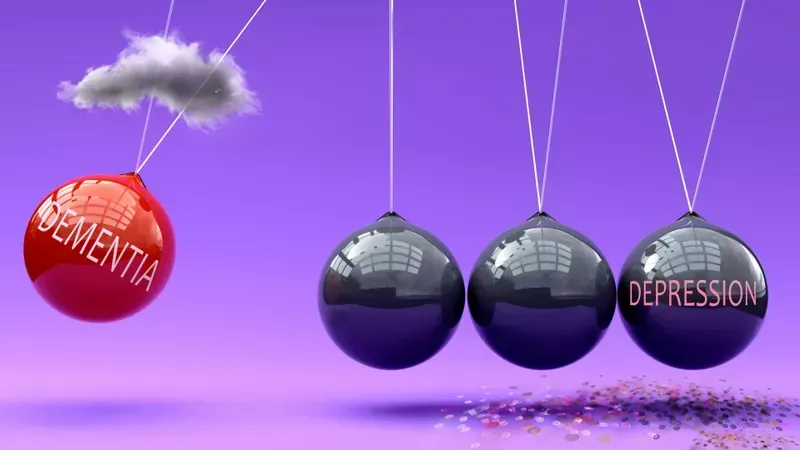BLOG
Dementia and Depression: How One Affects The Other
Dementia and depression are two complex and often interconnected conditions that significantly impact individuals' lives, particularly as they age. Dementia refers to a group of neurological disorders characterized by cognitive decline. At the same time, depression is a mental health condition marked by persistent feelings of sadness, hopelessness, and a loss of interest in activities. Understanding the relationship between these two conditions is crucial for providing comprehensive care and improving the quality of life for those affected. They can often coexist, and one can influence the other in various ways, leading to a complicated and challenging situation for patients, families, and healthcare providers.
Understanding Dementia
Dementia is a broad term that describes a decline in cognitive function severe enough to interfere with daily life. It is not a single disease but rather a collection of symptoms associated with various conditions that affect the brain. The most common types of dementia include Alzheimer's disease, vascular dementia, frontotemporal dementia, and Lewy body dementia. Each type of dementia has distinct characteristics, but they all share common symptoms such as memory loss, confusion, difficulty with communication, impaired judgment, and changes in behavior.

The impact of dementia extends beyond cognitive decline. It also affects emotional health, leading to mood, behavior, and personality changes. Individuals with dementia may experience increased anxiety, irritability, and apathy. The progressive nature of dementia often leads to feelings of frustration and helplessness as the individual becomes aware of their cognitive decline.
Understanding Depression
Depression is a common mental health disorder characterized by persistent feelings of sadness, worthlessness, and a lack of interest or pleasure in most activities. It can affect anyone, regardless of age, but it is particularly prevalent among older adults, especially those with chronic illnesses or cognitive impairments. Depression is often underdiagnosed in the elderly, as its symptoms can overlap with those of dementia or be mistaken for normal aging.
Common causes of depression include genetic factors, chemical imbalances in the brain, and environmental stressors. In older adults, depression can be triggered by significant life changes, such as the loss of a loved one, social isolation, or declining health. The risk factors for depression also include a history of mental health disorders, chronic medical conditions, and certain medications.
How Dementia Can Lead to Depression
Dementia can significantly impact mental health, and the cognitive and emotional changes associated with the condition can often lead to depression. As dementia progresses, individuals may struggle with the loss of independence, the inability to perform daily tasks, and the realization that their cognitive abilities are deteriorating. These experiences can trigger feelings of sadness, frustration, and hopelessness, all of which contribute to the development of depression.
Several factors can trigger depression in individuals with dementia. Social isolation is a significant factor, as those with dementia may withdraw from social interactions due to communication difficulties or a lack of confidence. The loss of a sense of purpose, as they are no longer able to engage in activities they once enjoyed, can also lead to depression.
Early detection and intervention are crucial in managing depression in individuals with dementia. However, diagnosing depression in dementia patients can be challenging, as the symptoms of the two conditions often overlap. For example, both conditions can cause changes in appetite, sleep disturbances, and a lack of interest in activities. Healthcare providers must carefully assess the individual's symptoms to distinguish between depression and dementia and provide appropriate treatment.
Managing Both Conditions
Managing these simultaneously requires a comprehensive and holistic approach to care. Treatment options for dementia typically focus on slowing the progression of cognitive decline and managing symptoms, while treatment for depression may include medication, therapy, and lifestyle changes. Combining these approaches can help improve the overall quality of life for individuals with both conditions.

Medications, such as antidepressants, can be effective in treating depression in these patients, but they must be used with caution due to potential side effects and interactions with other medications. Non-pharmacological approaches, such as cognitive behavioral therapy (CBT) and counseling, can also be beneficial in addressing the emotional and psychological aspects of depression. These therapies provide individuals with coping strategies and help them manage their feelings of sadness and anxiety.
A holistic approach to care involves addressing the physical, emotional, and social needs of the individual. This includes providing a supportive environment, ensuring that the individual feels safe and valued, and offering opportunities for meaningful engagement. Caregivers should work closely with healthcare providers to develop a personalized care plan that considers the unique needs and preferences of the individual.
Seek Professional Help
The relationship between dementia and depression is complex, with each condition influencing the other in various ways. Understanding how dementia can lead to depression and recognizing the importance of comprehensive care is crucial in managing both conditions effectively. Early detection, appropriate treatment, and a holistic approach to care can help improve the quality of life for individuals. Seeking professional help and support is essential in navigating the challenges of these conditions and ensuring that the individual receives the care they need.
Assured Senior Living is committed to providing compassionate and personalized care for individuals with dementia and related conditions. Our experienced staff understands the challenges of managing both dementia and depression and is here to support you and your loved ones every step of the way. Contact Assured Senior Living today to learn more about our services and how we can help you create a care plan that meets your needs.
Sources
Depression and Risk of Developing Dementia (Nat Rev Neurol. 2011 May 3; 7(6): 323–331.Published online 2011 May 3. doi: 10.1038/nrneurol.2011.60) -
Individuals with Depression Are Over Two Times as Likely to Be Diagnosed with Dementia, Penn Medicine Research Finds (Penn Medicine News Release)















